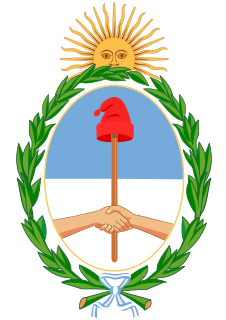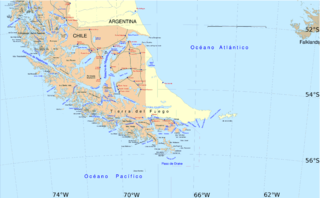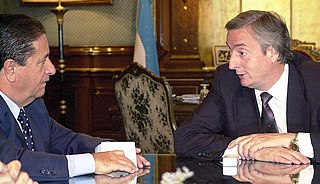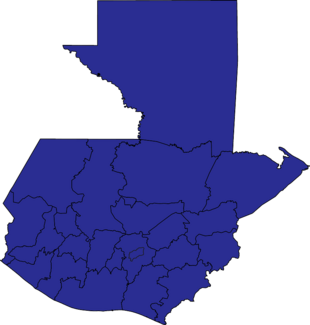
Carlos Saúl Menem Akil is an Argentine politician who was President of Argentina from July 8, 1989 to December 10, 1999. He has been a Senator for La Rioja Province since December 10, 2005.

This article deals with the diplomatic affairs, foreign policy and international relations of Argentina. At the political level, these matters are officially handled by the Ministry of Foreign Relations, also known as the Cancillería, which answers to the President. The Minister of Foreign Relations, since June 2016, is Chancellor Jorge Faurie.

Raúl Ricardo Alfonsín Foulkes was an Argentine lawyer and statesman who served as the President of Argentina from 10 December 1983 to 8 July 1989. Alfonsín was the first democratically elected president after more than seven years of military dictatorship and is considered the "father of modern democracy in Argentina". Born in Chascomús, Buenos Aires Province, he began his studies of law at the National University of La Plata and was a graduate of the University of Buenos Aires. He was affiliated with the Radical Civic Union (UCR), joining the faction of Ricardo Balbín after the party split.
Mariano Grondona is an Argentine lawyer, sociologist, political scientist, essayist and commentator. He has been a journalist for several decades, appearing in print media and on television, and has written several books. He has also taught in several universities, both in Argentina and abroad.

Isaac Francisco Rojas Madariaga was an Argentine Admiral of the Navy and de facto Vice President of Argentina. He joined the Argentine Navy and had an unremarkable career until the 1946 election of Juan Perón.

Argentina–Chile relations refers to international relations between the Republic of Chile and the Argentine Republic. Argentina and Chile share the world's third-longest international border, which is 5,300 km (3,300 mi) long and runs from north to the south along the Andes mountains. Although gaining their independence during the South American wars of liberation, during much of the 19th and the 20th century relations between the countries were chilled as a result of disputes over the border in Patagonia, although Chile and Argentina have never engaged in a war. In recent years relations have improved dramatically. Despite increased trade between the two countries, Argentina and Chile have followed quite different economic policies. Chile has signed free trade agreements with countries such as China, the USA, Canada, South Korea and the EU and is an active member of the APEC, while Argentina belongs to the Mercosur regional free trade area. In April 2018, both countries suspended membership of the Union of South American Nations.

The region of the Beagle Channel, explored by Robert FitzRoy in the 1830s, was one of the last to be colonized by Chile and Argentina. The cold weather, the long distances from other inhabited regions, and the shortage of transport and subsistence, kept it far from the governmental task.

On 22 July 1971 Salvador Allende and Alejandro Lanusse, the Presidents of Chile and Argentina, signed an arbitration agreement. This agreement related to their dispute over the territorial and maritime boundaries between them, and in particular the title to the Picton, Nueva and Lennox islands near the extreme end of the American continent, which was submitted to binding arbitration under the auspices of the United Kingdom government.

Operación Soberanía was a planned Argentine military invasion of Chile started on 22 December 1978 due to the Beagle conflict dispute. The invasion was halted after a few hours and Argentine forces retreated from the conflict zone without a fight. Whether the Argentine infantry actually crossed the border into Chile has not been established. Argentine sources insist that they crossed the border.

The direct negotiations between Chile and Argentina about the islands and maritime rights in Beagle conflict began after the Queen Elizabeth II of the United Kingdom announced on 2 May 1977 the judgement of the Beagle Channel Arbitration to the governments of both countries. The court ruled that the islands and all adjacent formations belonged to Chile. The direct negotiations finished with the Act of Montevideo on 9 January 1979, where both countries accept the papal mediation after Argentina's call off of the Operation Soberanía. This was the most dangerous phase of the Beagle Conflict and there was a real possibility of open warfare.

The Papal mediation in the Beagle conflict followed the failure of negotiations between Chile and Argentina, when, on 22 December 1978, the Argentinian Junta started Operation Soberanía, to invade Cape Horn and islands awarded to Chile by the Beagle Channel Arbitration. Soon after the event, Pope John Paul II offered to mediate and sent his personal envoy, Cardinal Antonio Samoré, to Buenos Aires. Argentina, in acceptance of the authority of the Pope over the overwhelmingly Catholic Argentine population, called off the military operation and accepted the mediation. On 9 January 1979, Chile and Argentina signed the Act of Montevideo formally requesting mediation by the Vatican and renouncing the use of force.
The history of Argentina can be divided into four main parts: the pre-Columbian time or early history, the colonial period (1530–1810), the period of nation-building (1810-1880), and the history of modern Argentina.

The Snipe incident was a military incident that took place between Chile and Argentina during 1958 as a result of a disputed border line in the Beagle Channel.

Argentina–Italy refers to the current and historical relations between Argentina and Italy. Both nations enjoy friendly relations, the importance of which centers on the history of Italian migration to Argentina. Argentines of full or partial Italian ancestry number approximately 25 million, or 62% of the country’s total population. Both nations are members of the G20.

The Boundary Treaty of 1881 between Argentina and Chile was signed on the 23 July 1881 in Buenos Aires by Bernardo de Irigoyen, on the part of Argentina, and Francisco de Borja Echeverría, on the part of Chile, with the aim of establishing a precise and exact borderline between the two countries based on the uti possidetis juris principle. Despite dividing largely unexplored lands, the treaty laid the groundwork for nearly all of Chile's and Argentina's current 5600 km shared border.

Federal Peronism, or Dissident Peronism, are the informal names given to a political alliance between Justicialist Party figures, currently identified mostly by its opposition to ruling Kirchnerism, the center-left faction that headed the national Government of Argentina from 2003 to 2015, and leads the Peronist movement.

A referendum on the territorial dispute with Belize was held in Guatemala on Sunday April 15, 2018. Voters were asked whether the Guatemalan government should request the International Court of Justice to finally resolve the territorial dispute, as part of a commitment signed in December 2008 between Guatemala and Belize. Guatemalan Vice President, Jafeth Cabrera, stated that Belize would hold their referendum in response in May 2018, but Belize released a statement denying this, stating rather that they will hold the referendum after the re-registration process has occurred to ensure an accurate and fair vote.


















